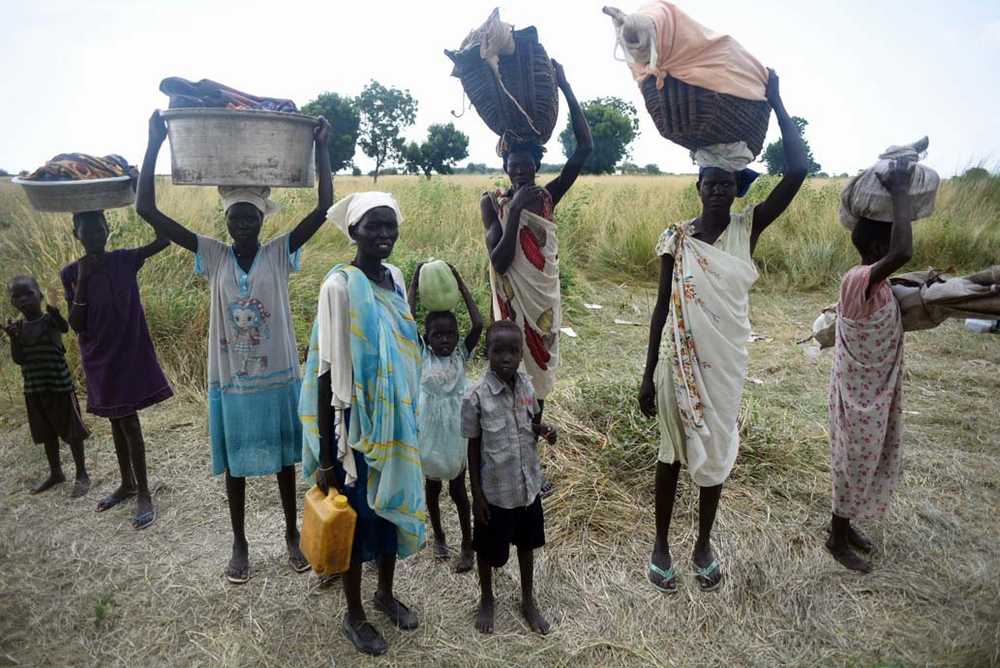KOCH, South Sudan — Sarah Nyanchar fled her home in South Sudan’s war-torn Unity state months ago, but with fighting continuing despite a peace deal signed last month, she still doesn’t feel safe enough to return and begin rebuilding her life.
“The peace did not reach here,” Nyanchar told The Associated Press on Friday, after venturing from her hiding place in a rural forest to Koch town to get food aid.
“We heard that there would be no fighting here,” she said, adding that she has heard clashes since the peace accord was signed at the end of August.
South Sudan has been hit by a civil war since December 2013 when President Salva Kiir, an ethnic Dinka, fired his vice-president Riek Machar, an ethnic Nuer. The fighting has often been marked by ethnic violence. Tens of thousands have been killed and 2 million have been displaced, according to the U.N. The peace agreement was supposed to end the conflict, but fighting has continued.
Accompanying deliveries of food aid, The Associated Press visited two towns in Koch County of South Sudan’s Unity state, one held by the government and the other held by rebels. People gathered in both centers to get food assistance, but said they feared new rounds of violence.
Swampy, oil-rich Koch County bore the brunt of a government offensive launched in late April. The army and its allied militias raped and murdered civilians and burned villages in that campaign, according to the U.N. Now the government controls most towns in the area and the rebels operate from the countryside.
The rebels attacked Koch town twice this month, the government’s deputy county commissioner William Malual told AP, speaking with a pickup truck full of young soldiers bristling with weapons behind him.
The rebels blame the government for the violence, said opposition spokesman George Gatloy, speaking in rebel-held Bauw village.
U.S. Ambassador to South Sudan Mary Catherine Phee met with local leaders on both sides on Friday and urged them to respect the peace so relief can flow in.
“It’s important for them to understand that they, too, have a responsibility to contribute to peace building. It’s not just a decision in Juba at the top,” she said, referring to South Sudan’s capital city.
At higher levels, the two sides appear to be tentatively moving ahead with implementation of the peace deal. Senior military commanders on both sides have met in Addis Ababa, Ethiopia to plan security arrangements, though they failed to resolve all differences.
The government army on Friday began preparations to demilitarize South Sudan’s capital, one of the cease-fire’s most contentious clauses, according to spokesman Col. Philip Aguer.
A window of calm in Koch County allowed aid groups to visit government-held Koch town and rebel-controlled Bauw village to assess humanitarian needs and bring relief for the first time since the government’s spring offensive began.
In Bauw, people said they’d been living off wild fruits and water lilies to survive. Women and children cowered from heavy rains under plastic tarps and trees near the remains of charred structures destroyed during the offensive.
In Koch, people stood in long lines under the midday sun for their food while others waited under shady trees for medical examinations.
UNICEF’s South Sudan representative Jonathan Veitch said the food security situation in the two areas appeared better than expected with low rates of child malnutrition despite earlier famine fears, but he said there were worrisome outbreaks of watery diarrhea, measles, and malaria.
In Koch, Nyanchar said she won’t wait to see if this lull in fighting will last. Clutching a yellow token which entitles her to a sack of World Food Program sorghum, she said she’d head for the uncertain bush as soon as she received her food because she did not feel safe with the soldiers in town.

